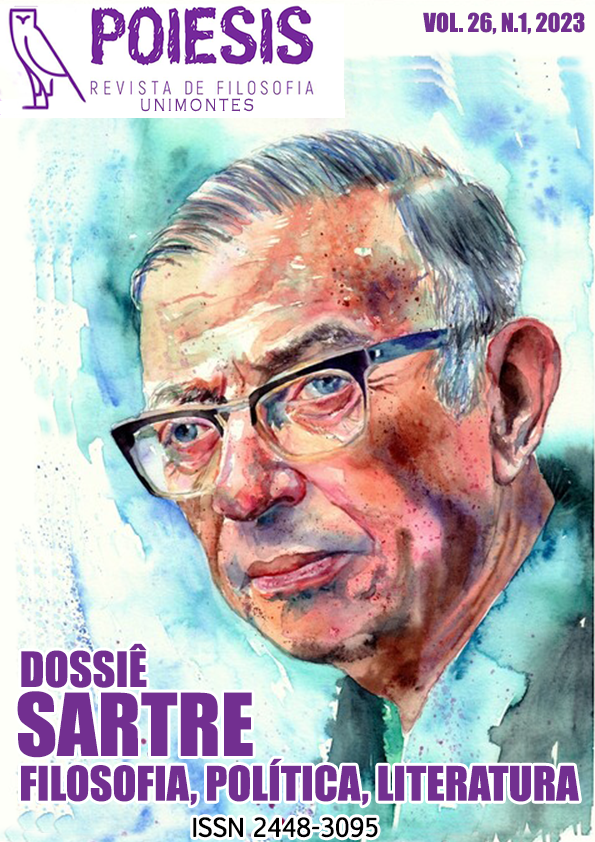THE SPECIFICITY OF THE SONG IN THE NOVEL NAUSEA
Keywords:
Nausea. Contingency. Necessity. Song. Art.Abstract
In the novel Nausea, Jean-Paul Sartre presents to the reader the diary of Antoine Roquentin,
a historian who has been experiencing a type of existential discomfort that he will call nausea. As this
nausea intensifies, the character discovers a kind of wild reality, the everyday world goes undressing
and the existence losing its habitual sense. Amid this disconcerting experience, a song appears as a
momentary antidote to this malaise, so that whenever Roquentin hears "Some of These days" on the
bar’s gramophone he feels the nausea drain away. In fact, throughout his nauseating journey the
character comes across other artistic manifestations, none of them, however, is able to provide an
experience similar to that of the song. Therefore, the objective of this article is to investigate the
reasons why only the song seems able to stop the effects of nausea. Thus, we will try, first, to establish
a difference between the cancional form and the reality revealed by nausea, showing that while reality
is governed by contingency the song is an imaginary object in which each element occurs by necessity. Then, we will compare Roquentin’s relationship with the song, the cinema and the
literature, in order to understand what brings him closer to an artistic manifestation and that moves
him away from others. Thus, this reflection will seek, finally, to show that the predilection of the
character for the song is less by its formal characteristics than by the context in which it presents itself,
that is, it is not a specificity of the beauty of the song, but the way it fits into Roquentin’s life.
Downloads
References
CONTAT, M; RYBALKA, M. La Nausée. Notice. In: SARTRE, J.-P. Œuvres
Romanesques. Paris: Gallimard, 2018, p. 1657-1678.
COOREBYTER, Vincent de. Sartre avant la phénoménologie. Bruxelles : OUSIA, 2005.
NEGREIROS, Eliete Eça. Ensaiando a canção: Paulinho da viola e outros escritos. Cotia:
Ateliê Editorial, 2011.
NOUDELMANN, François. Le toucher des philosophes. Paris : Gallimard, 2008.
SARTRE, Jean-Paul. Conferência de Jean-Paul Sartre – Universidade Mackenzie – 1960. In:
Discurso, São Paulo, n. 16, p. 7 – 32, 1987b. Disponível em < http://www.revistas.usp.br/discurso/article/view/37918 >.
______. L’art cinématographique. In : Les écrits de Sartre. Paris: Gallimard, 1990a, p. 546-552.
______. Nick’s Bar, New York City. In : Les écrits de Sartre. Paris: Gallimard, 1990b, p. 680-682.
______. L’imaginaire : Psychologie phénoménologique de l’imagination. Paris: Gallimard, 2010.
______. A Náusea. Rio de Janeiro: Nova Fronteira, 2011.
______. A transcendência do ego. Petrópolis: Vozes, 2013.
______. L’être et le néant. Paris: Gallimard, 2014.
______. Œuvres Romanesques. Paris: Gallimard, 2018.
SILVA, Franklin Leopoldo e. Ética e literatura em Sartre. São Paulo: UNESP, 2004.
WEIDMANN, Artur Ricardo de Aguiar. “O efeito do jazz em A Náusea de Jean-Paul Sartre”.
Revista ArteFilosofia, Ouro Preto, n. 21, p. 145-159, 2016. Disponível em: < https://periodicos.ufop.br:8082/pp/index.php/raf/article/view/433 >.
Downloads
Published
How to Cite
Issue
Section
License
Copyright (c) 2023 Revista Poiesis

This work is licensed under a Creative Commons Attribution-NonCommercial-NoDerivatives 4.0 International License.





.png)

